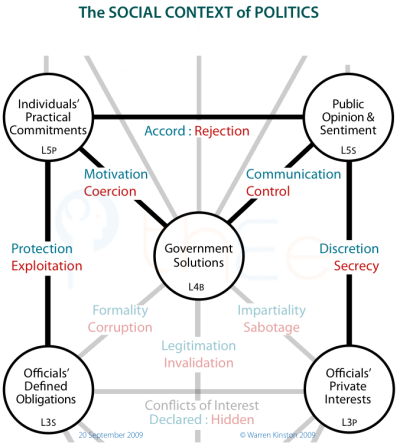Influences of «The People»

What people en masse do (CL5P) and what people en masse think (CL5S) are powerful shapers of government solutions (L4B). The social context exerts influence both upwards and downwards, even bypassing Government Solutions-CL4B.
 Everybody Counts for Something…
Everybody Counts for Something…
CL5S ↔ CL5P
Public Opinion ↔ Individual Commitment
Individual commitments are necessarily affected by public opinion and social mood which impact on every individual to some degree. Generally an alignment is desired. Accord is valued because of the feelings of belonging and confidence that result.
An individual must at least acknowledge what everybody thinks. The public may be tolerant of idiosyncratic private actions of individuals—at least as long as any flouting of cultural values or social conventions is handled discreetly. If a disconnect develops, then an active Rejection results. The individual is ready to act in ways that reject public opinion and public opinion will reject and even become hostile to idiosyncratic activities.
More… It can be extremely difficult for a person to take action which may, or even will, benefit himself, when the whole of society is thinking differently. Yet, the fact that everybody thinks in a particular way may lead to opportunities for an independent-minded person. This is normally the case in relation to stock-market investment.
It can be extremely difficult for a person to take action which may, or even will, benefit himself, when the whole of society is thinking differently. Yet, the fact that everybody thinks in a particular way may lead to opportunities for an independent-minded person. This is normally the case in relation to stock-market investment.
 People en masse have Massive Leverage…
People en masse have Massive Leverage…
CL5S ↔ CL4B
Public Opinion ↔ Government Solutions
Public sentiment is often a major factor affecting government choice. The practical reality is that many government solutions require public cooperation and are unlikely to succeed if people generally are opposed.
Governments tend to flow with public opinion or to ignore it completely, depending on the issue, regime or stage of the election cycle. Governments prefer to win over the public and the public likes to endorse (and possibly criticize or soundly reject) what is proposed. The Channel here is named Communication.
When the mood is ugly, choices may be taken to mollify or show that government is sympathetic. Such choices, commonly irrational on close analysis, are said to be «politically required». The media is often co-opted by both sides, although government has the advantage. What both sides would like, however harmful that might be, is Control. Governments like to own the media, or censor as much as they can.
 Curiosity Killed the Cat…
Curiosity Killed the Cat…
CL5S ↔ CL3P
Public Opinion ↔ Officials' Private Interests
The public is curious about its public officials, and the media automatically focuses on anyone in the political realm who has influence. In all cases, the personality behind the official and their private interests are natural public concerns. Both sides must handle this with Discretion. The path commonly chosen, Secrecy, occurs because of the frailties and temptations that abound for anyone in the public eye.
 Know on What Side your Bread is Buttered…
Know on What Side your Bread is Buttered…
CL5P ↔ CL4B
Individual Commitments ↔ Government Solutions
People make practical decisions in the light of governmental solutions. Often the solution is deliberately designed to incentivize individuals to act in a particular way.
The reverse situation also holds true: if individuals can create a reality on the ground by their own spontaneous choices, this can be a powerful motivation for a particular solution to be chosen. Motivation is the positive force in this Channel.
The negative form of this Channel is Coercion. A government may view some individual action as harmful to society (e.g. investing abroad). So the government devises a solution that prevents individuals acting in their own interests. The solution may be a genuine (even if mistaken) option, but too often it is about enhancing central authority or to enable corrupt benefits.
 Individuals Expect some Protection…
Individuals Expect some Protection…
CL5P ↔ CL3S
Personal Commitment ↔ Official Duties
Officials have an obligation to consider the practical commitments made by people on the basis of governmental policies and society’s laws. Protection is the desirable condition in the Channel.
If government priorities change, individuals may be reluctant to modify arrangements based on past assurances. The revocation of governmental guarantees («promises») is common, especially if there is no come-back. If government officials think of the people as fodder for their grand strategies, this is Exploitation. People may also be ready to exploit officials if given the chance.
 Where «The People» have Limited Influence…
Where «The People» have Limited Influence…
Public opinion and sentiment-CL5S have no direct effect on officials’ obligations-CL3S. But indirect influence occurs if politicians panic for electoral reasons (CL3P), or if likely non-cooperation means the government’s solution-CL4B won’t work and officials go back to the drawing board.
Practical commitments made by individuals-CL5P are similarly irrelevant to the private interests of officials-CL3P except indirectly.
Neither social Centre requisitely influences the rule of law-CL2B—the public is normally mystified by its workings. Struggles by groups for differential benefits-CL1B are also unaffected directly.
- We now have to consider what higher factors, moral and personal, might be significant. Continue to the moral context for political choice.
Originally posted: July 2009; Last updated: 12 June 2014.

![]() Everybody Counts for Something…
Everybody Counts for Something…![]() People en masse have Massive Leverage…
People en masse have Massive Leverage…![]() Know on What Side your Bread is Buttered…
Know on What Side your Bread is Buttered…![]() Individuals Expect some Protection…
Individuals Expect some Protection…![]() Where «The People» have Limited Influence…
Where «The People» have Limited Influence…